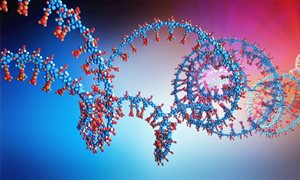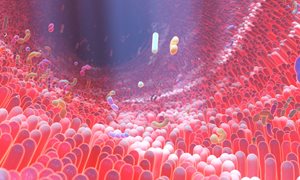
Today a new vaccine against malaria, largely developed in Nijmegen, is being tested for the first time in volunteers at Radboudumc.
Almost half a million people die of malaria every year, especially young children in Africa. The germs of malaria (the parasites) are transferred from one person to another via the malaria mosquito. This new vaccine aims to prevent this transmission, so malaria cannot spread further.
New concept
Scientists from Nijmegen were at the forefront of this vaccine in the 1990s, when they discovered a protein of the parasite (the Pfs48 / 45 protein) that plays an essential role in the transmission of the malaria parasite to the mosquito. By switching off this protein, the formation of new parasites in the mosquito can be blocked. This prevents other people from being infected via a mosquito bite. The vaccine doesn’t prevent you from getting malaria yourself, but it prevents the spread of malaria in other people. This was a completely new concept at the time. Together with Danish colleagues from the Statens Serum Institute, this protein has now been developed into a form (called R0.6C) that can be administered as a vaccine against malaria.
Antibodies
The so-called R0.6C vaccine is a recombinant product that targets the Pfs48 / 45 protein. This vaccine must generate antibodies (antibodies) against this protein in humans. If someone with malaria and the administered vaccine is bitten by a mosquito, that mosquito will also ingest the antibodies. Those antibodies will block the development of the parasites in the mosquito. This prevents further spread of malaria in the human population.
Safety first
Whether the concept works must be carefully tested of course. The first test (phase 1 study), which is now being carried out on volunteers at Radboudumc, is investigating the safety of this vaccine. It’s also being examined whether antibodies that can prevent the transmission of malaria are indeed formed in the blood of the volunteers.
More at www.radboudumc.nl/malariavaccin
More at malaria
-
Want to know more about these subjects? Click on the buttons below for more news.
Related news items

Large AI project receives over €95 million for ten years of public-private research
23 September 2021 The Dutch Research Council (NWO) is to fund two consortia for a period of ten years. Radboudumc participates in the ROBUST consortium, which consists of 17 AI labs, eight of which are dedicated to healthcare. Radboudumc leads five of these eight labs. go to page
Nijmegen literally puts Digital Health on the map Flourishing ecosystem gets its own interactive overview
22 July 2021 Digital Health is thriving in the Nijmegen region, where it contributes to better care and health and also creates jobs. To bring developers and end users even closer together, The Economic Board and the Radboudumc are introducing the Interactive Digital Health map. go to page
Next Generation cytogenetics is on its way Does Optical Genome Mapping turn cytogenetics upside down?
7 July 2021 Dutch-French research shows that Optical Genome Mapping (OGM) detects abnormalities in chromosomes and DNA very quickly, effectively and accurately. go to page
Human microbiome could shed light on higher morbidity rate in minoritized populations The link between environmental inequities and disease may lie in the gut
15 June 2021 A study published in PNAS is the first to explicitly address the gut microbiome as a pathway to understanding how environmental inequities could lead to health disparities. go to page
Miljoenen voor kennis- en investeringsconsortium op het gebied van AI
14 April 2021 Een kennis- en investeringsconsortium met het Radboudumc heeft acht miljoen euro subsidie gekregen om innovatie op het gebied van Artificial Intelligence (AI) versneld naar de markt te brengen. go to page